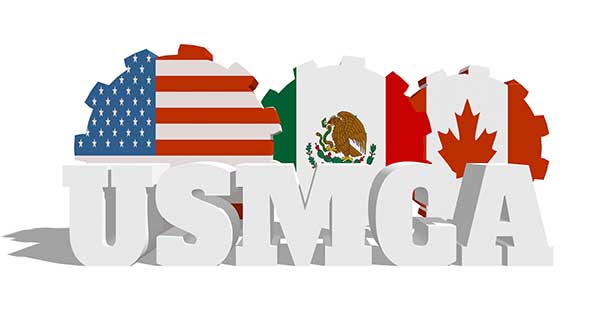Canadian News December 11, 2019
USMCA Approved, Expected to be Ratified
U.S. Congress isn’t likely to vote on the trade agreement that replaces NAFTA until the new year.
After more than a year of negotiations, the three North American Free Trade Agreement (NAFTA) member states have again come to an agreement on a revamped United States-Mexico-Canada Agreement (USMCA), paving the way for ratification by all three countries’ legislative bodies.

Top representatives for the three countries, including Mexico President Andres Manuel Lopez Obrador, Canadian Deputy Prime Minister Chrystia Freeland, U.S. Trade Representative Robert Lighthizer and White House adviser Jared Kushner, attended a signing ceremony this week at the National Palace in Mexico City.
I am delighted that Canada, the United States, and Mexico today took an important step towards ratification of the new NAFTA. pic.twitter.com/WQ4LI3x6Yw
— Chrystia Freeland (@cafreeland) December 10, 2019
The event took place after U.S. House Democrats, led by House Speaker Nancy Pelosi, and the White House announced they had come to an agreement on changes to the original USMCA, after a week of intense talks centered mostly on labor reform enforcement in Mexico. Pelosi’s announcement came just minutes after representatives from the House Democrats revealed the two articles of impeachment they plan to bring against President Trump.
Now, all three countries must ratify the amended version of the USMCA for it to become law and officially replace the NAFTA of 1994. In the U.S., it must be put to a vote in both the House and Senate. While proponents had hoped it would be passed before the end of the year, Senate Majority Leader Mitch McConnell said this week that a vote will not take place before its recess on Dec. 20 and not before an anticipated impeachment trial.
The first version of the USMCA had been agreed on by top trade advisors in October 2018. But concerns over labor reform enforcement in Mexico, environmental protection enforcement and patent provisions on biologic drugs led to prolonged negotiations. Negotiators made significant progress a month ago, and anticipated an agreement by the end of the year.
In particular, labor reforms and accompanying viable enforcement mechanisms have been one of the most significant obstacles to passing the new agreement. In response to those concerns, the new agreement creates a labor-specific inter-agency committee with representatives from all three countries to monitor and address labor practices in Mexico. In a big win for agreement proponents, Richard Trumka, head of the AFL-CIO, said he and his organization would back the new version of the agreement earlier this week.
“Make no mistake, we demanded a trade deal that benefits workers and fought every single day to negotiate that deal,” Trumka said in a statement this week, “and now we have secured an agreement that working people can proudly support.”
The clearer path to ratification eases much of the trade uncertainty that has impacted the economies and relations between the U.S., Canada and Mexico since negotiations began in January 2017, the same month Trump took office. In fact, final passage itself by all three countries will contribute positively to their economies, says Professor Alvaro Santos, a professor of law and faculty director of the Center for the Advancement of the Rule of Law in the Americas at Georgetown University, who also advised the Obrador administration on USMCA when Obrador first took office in Mexico last December.
Nancy Pelosi today announced a deal with the White House on the #USMCA trade agreement, calling it "a victory for America's workers." #GeorgetownLaw's Professor @AlvarSantos of @gtownCAROLA explains 3 key ways it differs from #NAFTA. #Legalese pic.twitter.com/ceqeO92A4s
— Georgetown Law (@GeorgetownLaw) December 10, 2019
“Stability is one of the biggest contributions of the new agreement,” he told ASI Canada. “For so long, a cloud of uncertainty has been hanging over us. The certainty now is a positive, it calms the waters, and investors can now plan long term. But the USMCA won’t automatically trigger growth. The framework will help and will incentivize them to reform, but governments still need to work on it.”
While companies in the promo industry aren’t sure they’ll see sweeping changes to the way they engage in cross-border business, they agree that moving forward in agreement on trade is a positive step forward.
“Anything that reduces tension and uncertainty is a positive development,” says Larry Cohen CEO of Top 40 distributor Axis Promotions (asi/128263). “A more stable environment allows business to plan and invest.”
Bret Bonnet, president of Top 40 distributor Quality Logo Products (asi/302967), says right now, the promo industry is looking more closely at the continuing tariff war between the U.S. and China. “That’s where most of our industry’s hard goods come from,” he says. “But any deal that results in countries working together and mutually profiting is wonderful.”
